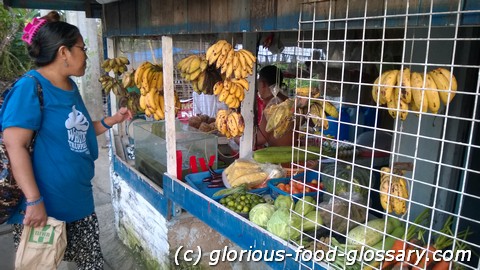Deutsch: Laden / Español: Tienda / Português: Loja / Français: Magasin / Italiano: Negozio
In the food context, Tindahan refers to a small store or shop in the Philippines that sells a variety of food items alongside other everyday necessities. These can range from small, family-run corner shops to slightly larger grocery outlets. In many Filipino communities, the tindahan is a crucial source of daily essentials, offering everything from fresh produce, snacks, and canned goods to beverages and household items.
Description
A tindahan typically serves the local community, providing easy access to basic commodities without the need to travel to larger supermarkets. These shops are often found within residential areas, making them conveniently accessible for day-to-day purchases. Tindahans play a vital role in the local economy, supporting small-scale entrepreneurs and offering personalized service that caters to the specific needs of the neighborhood.
Application Areas
In the culinary world, tindahans are essential for providing ingredients for Filipino households. They often stock a variety of local and imported food products, allowing for a mix of traditional Filipino and international cuisines to be prepared at home. Tindahans may also offer cooked food or snacks, serving as a quick and convenient option for those who do not have the time to prepare meals.
Well-Known Examples
While the concept of a tindahan is unique in its role within Filipino communities, similar types of stores can be found around the world, such as Bodegas in Latin America and New York City, konbini in Japan, and spätis in Germany. Each offers a tailored selection of goods to meet the needs of their respective communities, functioning as both a marketplace and a social gathering point.
Treatment and Risks
Shopping at a tindahan offers the advantage of buying items in smaller, more affordable quantities, often in the "tingi" system, where items are sold individually or in small portions. This system helps minimize food waste and allows for budget management. However, consumers should be mindful of the pricing, as convenience can sometimes come with a higher cost compared to buying in bulk from larger supermarkets.
Weblinks
- finanzen-lexikon.de: 'Laden' in the finanzen-lexikon.de (German)
- information-lexikon.de: 'Laden' in the information-lexikon.de (German)
Summary
The Tindahan is more than just a place to buy food and daily necessities; it represents a hub of community life in the Philippines, embodying the values of convenience, accessibility, and local entrepreneurship. These small stores enrich Filipino food culture by ensuring that essential ingredients and snacks are always within reach, contributing to the vibrant tapestry of local culinary practices.
--

Related Articles to the term 'Tindahan' | |
| 'Sari-Sari Store' | ■■■■■■■■■■ |
| A Sari-Sari Store in the food context refers to a small, neighborhood convenience store or kiosk in the . . . Read More | |
| 'Pasalubong' | ■■■■■■■ |
| Pasalubong refers to a Filipino tradition involving the giving of gifts or souvenirs, often food items, . . . Read More | |
| 'Palengke' | ■■■■■■■ |
| Palengke is the Filipino term for a public market where a variety of fresh produce, meats, seafood, and . . . Read More | |
| 'Isaw' | ■■■■■■ |
| Isaw in the food context refers to a popular Filipino street food made from skewered and grilled chicken . . . Read More | |
| 'Retail' | ■■■■■■ |
| Deutsch: / Español: Venta al por menor / Português: Varejo / Français: Commerce de détail / Italiano: . . . Read More | |
| 'Street' | ■■■■■■ |
| Street in the food context refers to \'street food,\' a category of food and beverages that are prepared, . . . Read More | |
| 'Büfe' | ■■■■■■ |
| Büfe is the Turkish general word for: snack bar kiosk, canteen, lunch corner, soda fountain, bar, convinience . . . Read More | |
| 'Tart Cherry (Sour cherry or Pie Cherry)' | ■■■■■■ |
| Tart Cherry (Sour cherry or Pie Cherry) : Tart Cherry is a variety of cherry which is sometimes called . . . Read More | |
| 'Supermarket' at top500.de | ■■■■■■ |
| Supermarket in the industrial context refers to a large retail establishment that sells groceries, fresh . . . Read More | |
| 'Tart Cherry' | ■■■■■■ |
| Tart Cherry is a variety of cherry which is sometimes called Sour cherry or Pie Cherry. Tart cherries . . . Read More | |
